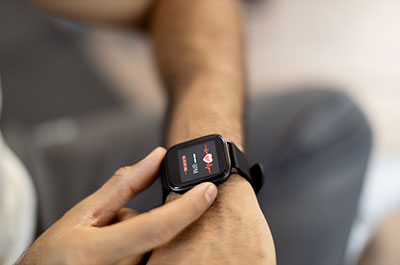If you are living with atrial fibrillation (AFib), the lifestyle choices you make every day can have an impact on the severity of your symptoms.
Common AFib flare symptoms may include:
- Rapid heartbeat
- Dizziness
- Heart palpitations or feeling like your heart skips a beat
- Shortness of breath
- Fatigue
“What you eat and drink can also sometimes spark AFib symptoms or make them worse” explains Dipak Shah, M.D ., a cardiologist and electrophysiologist at Henry Ford Health.
Here, Dr. Shah shares some food and drinks you might want to limit or skip to help minimize AFib.
Food and Beverages To Avoid If You Have AFib
- Alcohol. If you have AFib, drinking alcohol can have an almost immediate impact on your heart. While everyone has a different tolerance for alcohol, even one drink can cause changes in your heart rhythm. Binge drinking practices can have more devastating effects. If you have AFib, Dr. Shah recommends abstaining from alcohol to avoid possible flareups.
- Ultra-processed foods. Ultra-processed foods not only go through many stages of processing before hitting the shelves, but they also tend to contain added fillers and higher levels of sugar and sodium. Consuming these foods can impact your blood pressure and blood sugar levels, increasing your risk for AFib-related health complications. Processed meats (like hot dogs and bacon), packaged snacks, cookies and cereals, and frozen meals are all items to consider eliminating from your diet.
- Caffeine. “While any association between caffeine and your risk for AFib is not fully understood, many people prefer to avoid it,” says Dr. Shah. “Too much caffeine can cause heart palpitations even in individuals without AFib.”
- Grapefruit and grapefruit juice. Grapefruit juice commonly interacts with the effectiveness of several medications including some prescriptions for AFib. If you take medication to manage your AFib symptoms, make sure to check with your doctor or pharmacist to understand any possible food and beverage interactions.
- Fatty foods. Like foods with too much sugar or sodium, fatty foods can impact your health (specifically your cholesterol) that can increase your risk for AFib.
Be wary of low carb diets
As you pursue a more AFib-friendly diet, Dr. Shah warns against adopting low carb diets to manage your weight and eat better. Low carb diets have been found to increase your risk for AFib.
“Many people who cut out carbohydrates are then replacing those calories with animal fats and processed foods,” says Dr. Shah. “A balanced diet including those rich in whole grains, fruits and vegetables are important for your health.”
Lifestyle Changes To Help You Manage AFib

Making dietary changes is just one way that you can modify your lifestyle to lessen the impact of AFib. Dr. Shah also recommends these tips for managing AFib symptoms and reducing your AFib risk:
- Avoid overeating. Not only can overeating habits contribute to an increased risk for obesity (which then increase your risk for cardiovascular disease) but eating too much can also put added stress on your body. Your heart may need to work harder to help your body process extra calories, triggering AFib symptoms.
- Quit smoking. Not only does smoking damage blood vessels and impact your blood pressure levels, but it contributes to inflammation in the body that can have a serious impact on your heart.
- Exercise regularly. Combined with eating healthier, staying active can help you maintain a consistent weight. Plus, exercise can improve your cardiovascular health by lowing your resting heart rate. Both of these factors can lessen the frequency of AFib flares.
If you have AFib, talk to your cardiologist to understand how you can manage your symptoms. If lifestyle changes alone don’t provide relief, your provider can help you explore options for medication or additional treatments.
Reviewed by Dr. Dipak Shah, a cardiologist and cardiac electrophysiologist who sees patients at Henry Ford Heart Cardiology Consultants in Howell, Novi and Southfield.



